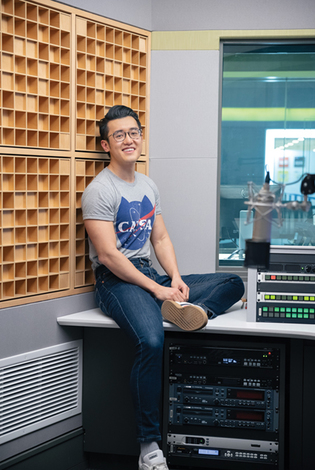
Gary Duong
Jeff Guo ’20JD says being a cohost on NPR was just right for him, because “the ethos and the vibe” matched his own. Besides, says Guo, he loves “nerdy things.”
View full image
Last summer, journalist and lawyer Jeff Guo ’20JD became cohost of NPR’s popular podcast Planet Money, a twice-weekly 20-minute show that explains complicated economic ideas in entertaining discussions. Guo studied math and economics at MIT and edited its student newspaper, and later worked as a reporter/researcher at the New Republic and as a writer on the Washington Post’s Wonkblog desk, covering economic policy. Three years later, Guo entered Yale Law School, where he was codirector of the Media Freedom and Information Access Clinic (MFIA—pronounced “Mafia”). After graduation, he was named NPR’s first Ishiyama Transparency in Government legal fellow, working on Freedom of Information Act requests. Eventually, he moved to Planet Money.
Zachary Groz: You’ve spoken about “explanatory journalism” as the form of reporting you’re most drawn to. What do you find so powerful about it?
Jeff Guo: There’s a lot of journalism out there that just tells you what happened, but I don’t find that very satisfying or elucidating, and I think it can be alienating. Serious people say, “Oh, it’s too complicated for ‘regular’ people to understand.” You hear this in certain industries—law, econ, finance—where people almost want to hoard information, or they want you to think that they are the experts and nobody else can understand what they do.
It feels really good to tackle something that’s complicated, and then show people that it’s not that messy, it’s not that arcane.
ZG: And that’s what you’re doing now on Planet Money. What ideas do you find yourself most drawn to when you’re thinking about doing an episode?
JG: One of the things that was exciting about joining the team was that I felt like the ethos and the vibe of the place matched my vibe. I love nerdy things and being able to learn something new every day and share the joy of it. Economists have a lot of fun. I don’t know if that’s indicated adequately to the public.
The most recent episode was an economic defense of gift-giving. Mostly I wanted to organize a Secret Santa for all my colleagues. It was a tour of three
Nobel Prize–winning economic theories that try to explain why gift-giving is rational and good. What I really enjoyed was that it was just a lot of fun. We also talked about interesting, sophisticated ideas in economics, and I hope it got people to do some Google searches. My goal is always: hopefully people are laughing—but also thinking, “Oh, my gosh, this is so interesting. I gotta go Google some more.”
ZG: Who have been some of the biggest inspirations for your journalistic work?
JG: When I made the decision to go to law school, I was working at the Washington Post, on the Wonkblog desk, which is similar to what Planet Money is doing—interesting, wonky explanatory journalism. It was a lot of fun, but we had just gone through an election cycle and I was a little burnt out. So I applied to law school—didn’t really expect to get in—and when the acceptance letter came, I was like, “Oh crap, what do I do?” Because I was pretty much doing the thing that I really wanted to do, which is journalism.
But I went to the weekend for admitted students. And the only reason I went was because, beforehand, I had emailed Emily Bazelon ’93, ’00JD, a person I had always admired, and who did the whole law school thing. She graciously agreed to meet with me and told me about her journey, and it made me think that law school was a place I wanted to be. Patrick Radden Keefe ’05JD is another Law School alum I really admire. He recognizes that a lot of societal conflict gets encoded in the law—that it’s an important cultural record of some things that matter the most to us as a society.
ZG: On the theme of YLS, I’m curious to hear about your time at the Law School’s MFIA clinic.
JG: In my first semester, I literally knew absolutely nothing, and they put me on a project they’d been working on for years: a Freedom of Information Act case. They were trying to push for this interesting new interpretation of the law, which would have been really powerful if it succeeded, but it didn’t. They were making their final push on the summary judgment brief—the brief we submit before the judge makes the final decision. And they were like, “Okay, Jeff and you will be writing this section of the brief.” I was like, “What? I literally just learned what a summary judgment is two months ago. I have no idea what this brief is supposed to look like.” It was an incredible amount of trust to place in someone with two to three months of law school under their belt. But that’s what was so amazing about the clinic. They really trusted us. It’s just a magical place.
 loading
loading